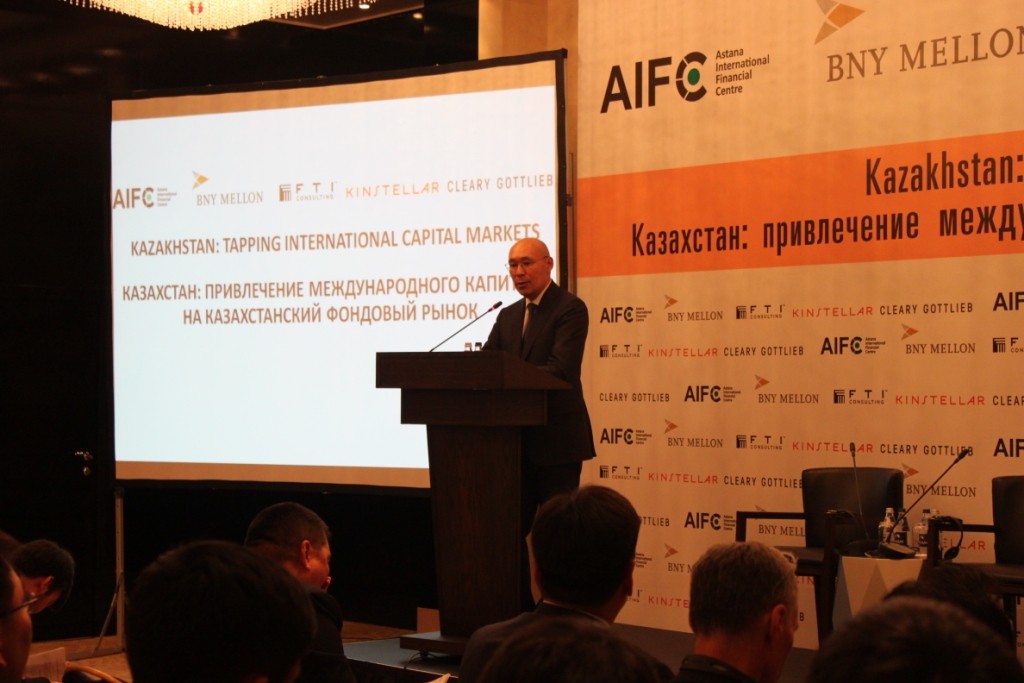ASTANA – The Astana International Financial Centre (AIFC) is planning to launch the Astana International Exchange (AIX) this fall, which is expected to help create conditions for further economic growth. The initiative was discussed at the international conference “Kazakhstan: tapping international capital markets,” held April 12 in the capital.
“Today, Kazakhstan’s economy is facing certain difficulties connected to the challenges in the banking sector of the economy. It is a cyclic problem and sooner or later it happens in any country, but, nevertheless, it is a period of ‘painful’ reforms in that sector. And we realise the need to create an alternative to bank loans. … In our country, good borrowers are not overburdened with loans and the level of bad debts is really high,” said AIFC Governor Kairat Kelimbetov at the event.
That alternative is the stock market under development in the country. To date, the existing KASE (Kazakhstan Stock Exchange) has not been able to show good results; its capitalisation is only 5 percent to GDP, while, for example, in Eastern European countries the rate is more than 15-20 percent, he added.
AIX will be the main platform for the initial public offering (IPOs) of Kazakhstan’s major companies as part of the much-discussed privatisation programme.
“A very good chance for the development of the stock market is the initiative on privatisation of the largest assets of national companies, which are part of the Samruk Kazyna Sovereign Wealth Fund announced by the head of state within the 100 [Concrete] Steps. The programme of their IPOs will begin in 2018 and in 2019-2020 we will see how the first companies – Air Astana and KazAtomProm – will be privatised… Privatisation in Kazakhstan is needed not to fill the holes in the budget, but to attract investments, to diversify investors and, most importantly, to improve corporate governance,” said Kelimbetov.
AIX will function under English law and will open access to a wide investors’ base. Its partners, the world’s largest exchanges, will be announced in May or June and help launch the most high-tech platform in the region, he added.
Thus far, AIFC has signed memorandums of understanding with the Warsaw, Shanghai and Moscow stock exchanges, as well as NASDAQ, and exchanges in South Korea and Saudi Arabia. A memorandum was also signed with the Japan Securities Dealers Association, Korea Capital Market Institute, Korea Financial Investment Association and other organisations specialising in Islamic finance.
“The stock exchange will serve as a mechanism for the diversification of the economy by providing access to capital and allowing Kazakh investors to benefit from the economic growth of the country by investing in local major and successful enterprises,” according to the AIFC press service.
AIFC is set to create a new infrastructure jointly with its partners in accordance with the world’s best standards. It will allow trading in securities, commodities and derivative securities with a full cycle of the business process: the organisation of trading and clearing and registering securities.
The conference was organised jointly with BNY Mellon, FTI Consulting and Kinstellar and brought together representatives of Credit Suisse, KMG D&S, Kazatomprom and experts and analytics in the investment and stock market development fields.
AIFC will assist in attracting investments to the Kazakh economy by creating an attractive environment for investing in financial services, developing the securities market and ensuring its integration with international capital markets.
One of the main features of the new financial centre is the fact that legislation will be based on English common law.
“World experience shows that 85 percent of all the biggest successful global and regional financial centres work in the model of the legal content of English common law. Some can argue which legislation is better – English common or continental, – but we see that basically financial models and financial regulation are oriented towards English common law. The simplest justification for this is that English common law is [based on] a precedent and, in fact, it is the most flexible,” said Kelimbetov.


